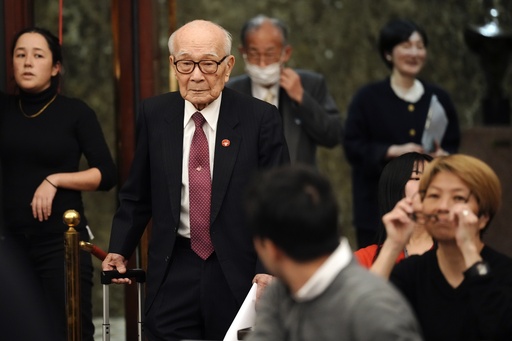
TOKYO — Survivors of the atomic bombings in Hiroshima and Nagasaki have expressed that being awarded the Nobel Peace Prize has revitalized their commitment to advocating for nuclear disarmament, coinciding with the upcoming 80th anniversary of the devastating attacks in 1945.
Terumi Tanaka, a 92-year-old survivor of the Nagasaki bombing on August 9, 1945, shared his reflections at a press conference in Tokyo, where he spoke after receiving the Nobel Peace Prize on behalf of Nihon Hidankyo, an organization for Japanese atomic bomb survivors. Tanaka emphasized the significance of next year, marking “a substantial milestone of 80 years” since World War II concluded. He expressed his desire to intensify efforts over the next decade and advocated for a widespread movement to share testimonials.
As a retired professor in materials engineering, Tanaka believes Japan should assume a leading role in nuclear disarmament initiatives. He questioned, “What other course is available for Japan, the sole nation to endure atomic bombings, if not to spearhead nuclear disarmament?” He indicated his intent to bring this matter before Prime Minister Shigeru Ishiba, who currently endorses nuclear deterrence, during their scheduled meeting in January. Despite survivors’ repeated pleas, Japan has not signed the Treaty on the Prohibition of Nuclear Weapons and continues to rely on U.S. nuclear protection.
Another survivor, Michiko Kodama, who experienced the Hiroshima bombing just three days prior to the Nagasaki attack, expressed her gratitude for the Nobel Prize recognition amid years of adversity, prejudice, and concerns about radiation health risks. She emphasized the need for greater public awareness regarding the true consequences of nuclear weapons. “As hibakusha (survivors), those of us who witnessed the aftermath… in a decade, we will no longer be able to recount the horrors of the atomic bombing,” Kodama, who was only seven years old during the attacks in August 1945, remarked. “I wish to continue sharing our stories for as long as I can.”
Nihon Hidankyo has been a grassroots organization composed of atomic bombing survivors for nearly 70 years, striving to maintain a societal taboo surrounding nuclear weapon use. Since the bombings, these weapons have dramatically increased in both potency and quantity, having been used in warfare only once by the United States against Japan.
The initial atomic strike on Hiroshima claimed the lives of around 140,000 individuals, while the subsequent attack on Nagasaki caused the deaths of an estimated 70,000 more. Japan ultimately surrendered on August 15, 1945, marking the conclusion of a conflict that began with Japan’s military aggression against Pearl Harbor in December 1941, during its broader ambitions in Asia.

